- Home
- Jane Arbor
Jasmine Harvest
Jasmine Harvest Read online
JASMINE HARVEST
Jane Arbor
Caroline Neville doubted the wisdom of her Aunt Clio’s request for her to go without delay to the South of France and keep an eye on her cousin Betsy, on holiday there. But Aunt Clio was convinced that her daughter had fallen into the clutches of a Riviera playboy.
Caroline arrived in Cannes to find that her aunt’s conjectures were only too true. Betsy was head over heels in love with the local charmer, Paul Pascal—and Caroline, remembering her own past experience of heartless charmers, was grimly determined to save her cousin from the same heartbreak.
And then Caroline realized, with sudden awful clarity, that she too was falling under Paul’s spell...
CHAPTER ONE
“Caroline, dear! So good of you to come at such short notice and in this awful weather! Come along in, do. You can’t think how glad I am to see you. Nor imagine the relief it was when I suddenly thought, Why of course—there’s always Caroline! and rang you and you promised to come—”
Mrs. Lane, who had opened to her niece’s knock with a promptitude which suggested she had been waiting behind the door, now closed it on the storm-racked July evening and led the way into a sitting-room where shrouded furniture, empty flower vases and closed curtains all bore out the evidence of the labelled air-luggage which was stacked in the hall.
Not that the Lanes’ imminent departure for America was news to Caroline. For at this season every year her Uncle Ralph, the self-made and wealthy Chairman of Biftek Canning, would take off for some far-flung city where he and his fellow meat packers of the free world would attend the earnest conclaves described irreverently by his daughter Betsy as “Daddy’s Get-Togethers with the Potted Tongues”, and Aunt Clio would go along on his expense account for the ride.
Two years ago it had been Buenos Aires. Last summer, Rio de Janeiro. This time it was to be Chicago, as Caroline had learned when, a week back, she had been bidden to the smart mews house in order to view the battery of Top Twelve clothes with which her aunt intended to assault America. But not expecting to see either of them again before they left England, Caroline had wished them bon voyage then and so had been caught unprepared by today’s urgent summons which had brought her beating up from Sidcup in a thunderstorm and by the first available train.
Earlier, calling her digs by telephone, Aunt Clio, never as mentally poised as she looked, had been even more staccato and cryptic than in her welcome at the door.
“Caroline?” she had queried. “Yes, dear—Aunt Clio here. Can you get up to see me? ... No, dear, tomorrow won’t do. We’re flying out in the morning. So it must be today ... Yes, as soon as you can make it and before Ralph is due home ... You will? Oh, bless you, dear. Not, I beg you, later than six for safety, and I’ll be expecting you.” But when she had poured sherry for Caroline from the lone bottle on view—“No choice of drinks, to offer you, dear, because Ralph has already closed the cellar and I didn’t want him to know I was going to ring you”—the story came out, dramatized to the hilt as, in Caroline’s experience, her aunt’s personal problems always were before they were solved. Usually by someone else, for what little Aunt Clio did not know about the art of appeal could be written on a postage stamp with margins to spare.
Hands expressive, brown velvet eyes wide, she breathed, “You’re going to agree that this is quite too awful, dear. It’s Betsy, you see—You knew, didn’t you, that we had let her go to the South of France with those friends of hers, the Drages?”
Caroline nodded. “Yes, and weren’t they going on to tour Italy afterwards?”
“They were. The Drages had taken this villa between Cannes and Grasse for a month, and that would have been up a day or two ago, I calculate. But when we last heard from them about a week back—a picture-postcard of the Croisette from Ann and a comic one from Tom Drage for Ralph—there wasn’t a whisper, not a breath then of all this!”
“Of all which?”
“Why, this about Tom and Ann having to go off to Italy without Betsy because she had flatly refused to go with them. They’ve gone. She has stayed on in the villa. Alone! Well, except for the maid they had. What do you make of that?”
Caroline “made” of it in silence for a minute. Then she objected, “How could Betsy have stayed on in the villa? Down there at this time of year, aren’t the next tenants panting to move in as soon as the previous ones move out?”
“Ah, but it wasn’t that kind of villa. I mean, not the sort they advertise in the Sunday papers. Or so the Drages said. It’s on some private estate, a flower-farm or something. Grasse, you know. Perfume-making and all that—” Mrs. Lane’s gesture was vague—“and the Drages were able to rent it through French friends of friends of theirs. So Betsy must have persuaded someone to let her keep it on, and if she says she is still there, I imagine she is.”
Caroline accepted the argument. “I suppose so,” she agreed. “But if when you last heard, the Drages were still there too, how do you know they’re not any longer and that Betsy is?”
“Dear—I told you! A week ago was when we heard from Tom and Anne. But Betsy herself telephoned this morning—thank goodness Ralph had gone to the office!—to say she had made the other two go on to Italy without her because she wanted to stay where she was. It was quite all right; everything had been arranged; she was O.K. for money and the Drages would pick her up as they came back. She was fine; riotously happy and everything was in glorious Technicolor. Love to Daddy and me and God bless for our trip. See us soon—See us soon, indeed! Believe it or not, Caroline, she would have rung off then if I hadn’t ordered her to reverse the charges and stay on the line until she had explained herself better than that!”
“I should have thought the explanations were due from the Drages.” Caroline’s tone was dry. “Do you mean they folded their tents and silently stole away, abandoning Betsy just like that, without a word to you or to Uncle Ralph?”
Mrs. Lane puckered a brow. “Tents, dear? They weren’t camping ... Oh, you were quoting! I see what you mean, and of course it was naughty of them, even though there was a letter from them by the second post.”
“Saying what?”
“Well, that Betsy had refused to budge, but hadn’t sprung it on them till the last minute. That they had had no choice but to go, because they had a tight timetable, meeting up with other people. But as they didn’t sound too worried or seem to think we should be, I’m afraid Betsy must have let them think she had our blessing or could get it. You know what a little wheedler the child is when she likes! And on the phone she had said as much herself—that we musn’t blame Tom and Ann, because it wasn’t their fault.”
“And what did you say to her on the phone?” Caroline asked.
“What could I say? After all, she is of age, even if only just. Besides, for the whole of the two months or more that we’re to be away, we’re lending the house to some friends of our hosts in Chicago, who’re crazy to live in a mews because I believe they think we throw parties in loose-boxes and whinny to our neighbors over half-doors! So that even if I had ordered Betsy home, there’d be nowhere for her to come home to, don’t you see?”
“And do I gather, Aunt Clio, that you haven’t told Uncle Ralph any of this yet?”
The soft brown eyes rounded. “Dear, I daren’t! Oh, of course he’ll have to know, but not, if I can help it, until after we have flown out tomorrow. Because he might refuse to go. In fact he would be almost sure to, and he must go. This year he is to be President of the Convention, and anyway, when you are married yourself, Caroline, you’ll learn that one does have to edit things for husbands, especially where their daughters and men are concerned.”
Surprise jerked up Caroline’s chin. “Men? Are we talking about Betsy and men?”
&n
bsp; “Not men, dear. But obviously it’s a man. The attraction which is keeping her on the Riviera, I mean.”
“Did she say so?”
“Well, not in so many words, though I’m sure she would have admitted it if I had pressed her. But I didn’t, because in my experience the fewer awkward facts you know, the better, when a man like Ralph begins to ask questions—”
“But I thought,” Caroline cut in, “that Betsy was as good as engaged to that rather solemn young buyer of Uncle Ralph’s, Edward Brant?”
“So she is. It’s not quite official, though the idea is it will be as soon as he gets back from the Argentine, where he is on his first big buying commission. Beef on the hoof, you know ... I like him very much, and Ralph, who used to call him ‘a promising lad’, now says he is ‘a coming man’, which from Ralph is high praise. But you do see how Edward complicates all this, poor boy? He’s crazy about Betsy, and I just did not know how I was ever to hint to Ralph that she might be thinking of jilting him for some Riviera playboy until, as I told you, I realized how you could help if you would. That in fact you could solve the whole thing.”
“I could? How?” asked Caroline warily.
“Don’t you see? By your going down to join Betsy at the villa, of course. If possible, before I need to tell Ralph. So that when I do, you would be there, which ought to satisfy him. And you could go, couldn’t you, seeing that for quite some time now you’ve been out of a job?”
Caroline demurred mildly, “Only if you call three weeks ‘quite some time’—and I’m not exactly on the breadline yet. It’s simply that I’m being rather choosy this time, looking for something where I can use my still fairly good French for more than the odd export letter I’ve been called on to write or to translate at Gainham’s—”
“Well, here is something, dear! Not a real job, of course. More of a holiday with a fine chance to practice your French if that’s what you want. And if you would go—why, look how it works out! I needn’t even tell Ralph I’ve been in touch with Betsy. The news could come from you or her by cable or letter to us in Chicago that when the Drages had suddenly had to change to plans which couldn’t include Betsy, they had arranged for her to keep on the villa and on the spur of the moment and without wanting to worry us just as we were leaving, she had begged you to join her and you had agreed. How’s that?”
“It isn’t,” quashed Caroline. “At least, not at that speed, Aunt Clio.”
“But it could be, dear. If you could get away, say tomorrow, and could book a seat on a Comet, it only takes ninety minutes to fly to Nice, didn’t you know? And you would be flying, of course. At my expense, just as I would make it right with your landlady for your room rental and give you the same allowance in traveller’s cheques as the Government says we may give Betsy. You’d let me do all that, I hope?”
“I most certainly would not!”
“Oh, Caroline—you mean you won’t go?”
“I didn’t say so. But tomorrow is too short notice, and for the rest, my arrangement with Mrs. White is that she is free to let my room whenever I’m away, and as I haven’t had a holiday yet this year I’m well in funds, though thank you all the same, Aunt Clio dear. Besides, if I do go I should be staying at the villa rent-free, and I admit I had thought of giving myself a few weeks in France, rubbing up my French before I went seriously for a job where it needn’t get rusty again.”
Mrs. Lane’s answer to that was a dramatic swoop and a hug which jeopardized Caroline’s sherry. “Then you will go, bless you? When? When, so that I can wire Betsy and we can book your air passage straight away?” she bubbled.
But Caroline was firm that she would not fly. Her original vague plan had envisaged visiting Paris for nostalgia’s sake, and it was from Paris that she would go south in her own fashion, though now, she promised, after only a day’s stay instead of longer.
“And when I get to—what’s the name of the place?” she asked.
“The Villa Mimosa, Prairies Pascal, Villon-Sur-Siagne. But I’ll tell Betsy to meet you at Cannes.”
“Well, then what am I to say to or do with her? If you’re right and she is tangled up with a man, am I supposed to try to prise her free of him? And if I can, do I bundle her off to join the Drages or what?”
Mrs. Lane bit her lip. “I don’t know. I’m afraid Betsy is like me—she can be led but she won’t be driven, and if she means to stay there, she will. So perhaps all you can do may be to remind her that she is, after all, practically engaged to Edward and then to use your influence with her. Your experience too, because it’s really that which makes you the very best person to help my little girl. I mean, you do know what infatuation is, and you put that rather unfortunate affair behind you so sensibly when it ended ... In fact, I’m always saying to Ralph how very balanced you’ve been about men ever since!”
“Thanks,” said Caroline, so curtly that she earned an alarmed glance from her aunt.
“Dear, I haven’t said the wrong thing, have I? You have got over that wretched, irresponsible creature, haven’t you? Let’s see, how long is it now since he let you down as he did?”
Still crisply, Caroline said, “About two years. But you’ve dropped no bricks. I’m entirely ‘over’ Roy Sanders, and we never were really each other’s type. It was simply that at the time I hated his having found it out before I did.”
“He could still have been kinder about letting you know it! Didn’t Betsy tell me you had a date with him the very night he rang you up to say he was leaving the country for good? And did, without giving you a chance to see him again?”
“Yes. But if he hadn’t gone then and that way, he probably would have done later, when it might have hurt a good deal more. And after all, are there any kind ways of breaking off a love-affair while one person is still involved?” Making a rhetorical question of it, Caroline put down her glass and rose. “Well, if that’s all, Aunt Clio, and you don’t want me to meet Uncle, I think I’d better go, hadn’t I?”
“If you say so, dear, and why, yes it is after six. And before Ralph comes in I must get through to Betsy again to tell her you’re coming and that you’ll let her know when to meet you at Cannes. Stay while I do it, if you like, dear. Or no, perhaps you’d better not, in case Ralph should happen to arrive—” And on the tide of her aunt’s nervous fear of discovery of her well-meant intrigue Caroline was ushered out.
Three nights later the station dock of the Gare de Lyon was showing only a minute to eight as Caroline dashed for the barrier between her and the train, noisily panting its determination to leave on time on its journey south.
At the barrier the inspector snatched at her ticket and seat-voucher, then thrust them back into her hand. “Dépechez-vous, Madame—vous êtes bien en retard!” As if she needed to be told to hurry and that she was late! thought Caroline. And then—“Voiture Quatre, Madame,” followed by something she did not catch, being already away down the platform, her case banging awkwardly against her legs as she ran.
She obediently counted coaches—One, Two, Three—Heavens! Number Four was not in sequence. After Three came a luggage-van, then a restaurant car, softly lighted and welcoming, but not the coach she sought. By the time she reached it, identifying it by the big “4” on its panels, doors were slamming all along the train and in the coach corridor there was only one belated porter to whom she could appeal for help in finding her couchette.
His response was impatient. He frowned over her seat-voucher as if puzzled by it, then with a “Par la” and a vague wave of his hand he directed her to a compartment of which the door stood ajar. He pocketed her tip and jumped down to the platform as the train gave a final warning shudder and began to move. Meanwhile every other occupant of the coach seemed to be standing in the corridor, and it was not until Caroline had snaked her way through them and reached the compartment that she realized it was almost certainly not hers.
For one thing, it was not of couchette type. It was a luxurious single berth as, she now remembered hav
ing noticed, were all its neighbors. And for another, though its owner was absent, there was ample evidence of his occupation in the assortment of male bric-a-brac and a copy of Paris Match on the table and in the cream pigskin valise on the rack.
Yet wasn’t this coach the “Voiture Quatre” of the ticket inspector’s direction and the number on this door Six, corresponding to her seat-voucher? Oh well, thought Caroline, whatever the mistake, it was not hers. It could be sorted out when the coach attendant came along, and until he did, as long as she contrived to look like a bird of passage, there was probably no harm in sitting down where she was instead of rejoining the press of people still standing about in the corridor even after all the farewells had been said.
She was blissfully tired at the end of this day spent in rediscovering “her” Paris—the one she and Daddy had shared—after ten years’ absence from it, and much of her pilgrimage had been on foot. Booking out from the hotel where she had spent the night after crossing from England, she had first taken her case to the Gare de Lyon and then boarded a bus in search of the street of tall, balconied houses where she had spent three happy years which she remembered in false retrospect as a whole era of her youth.
But she had not gone into Number Ten where their flat had been. It looked shabbier than she recalled it and she did not want to break her dream of its gracious if slightly passé interior. Besides, it had a new concierge who would not know her. Instead she had walked on to the lycée where at first she had been badly homesick for a familiar English classroom but to which she had switched all her loyalty once she had learned to chatter in French as readily as in her own tongue.
There, though school had broken up for the summer, a caretaker—also new since her time—had allowed her to wander round the building while he did his cleaning. She had found the last classroom she had occupied; sat in “her” desk, (whose was it now?) and identified the cloakroom hook where her coat and beret and satchel used to hang. Then she had re-explored the neighboring public gardens and at noon had gone for déjeuner to Le Chat Gris where, to her delight, she found herself not only remembered but welcome, almost feted.

 High Master of Clere
High Master of Clere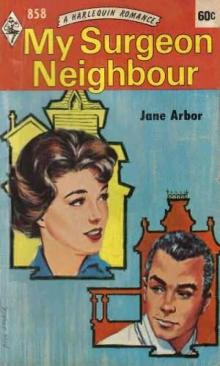 My Surgeon Neighbour
My Surgeon Neighbour Lake of Shadows
Lake of Shadows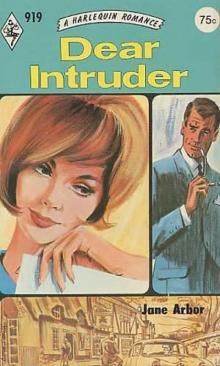 Dear Intruder
Dear Intruder Flash of Emerald
Flash of Emerald Return to Silbersee
Return to Silbersee Far Sanctuary
Far Sanctuary Sandflower
Sandflower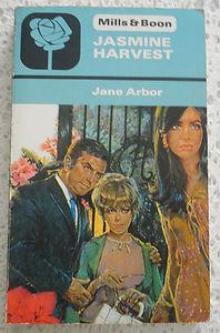 Jasmine Harvest
Jasmine Harvest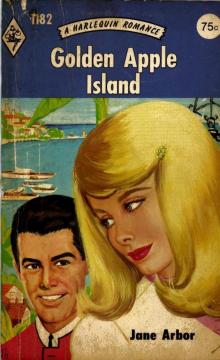 Golden Apple Island
Golden Apple Island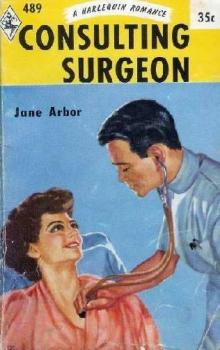 Consulting Surgeon
Consulting Surgeon Pact without desire
Pact without desire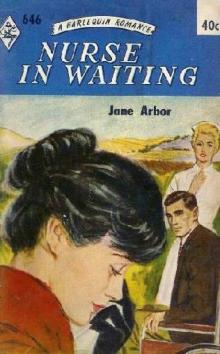 Nurse in Waiting
Nurse in Waiting Wildfire Quest
Wildfire Quest Roman Summer
Roman Summer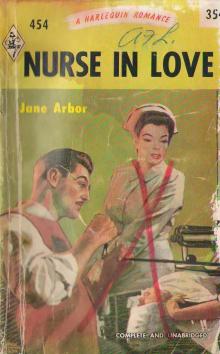 Nurse in Love
Nurse in Love Doctor's Love
Doctor's Love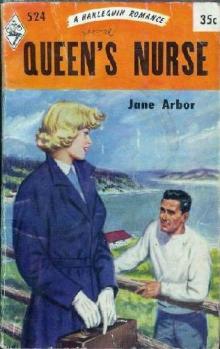 Queen's Nurse
Queen's Nurse Meet the Sun Halfway
Meet the Sun Halfway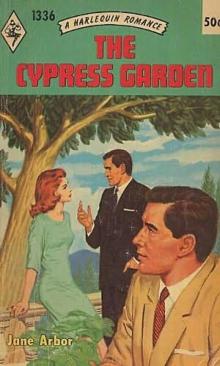 The Cypress Garden
The Cypress Garden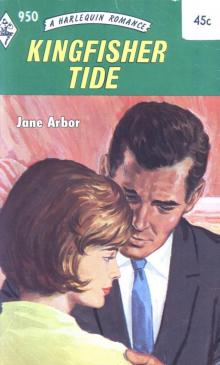 Kingfisher Tide
Kingfisher Tide A Growing Moon
A Growing Moon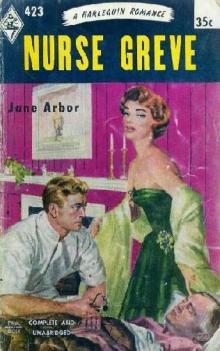 Nurse Greve
Nurse Greve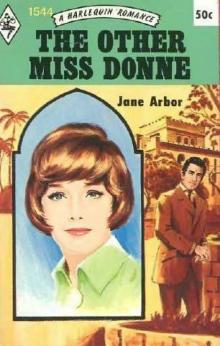 The Other Miss Donne
The Other Miss Donne